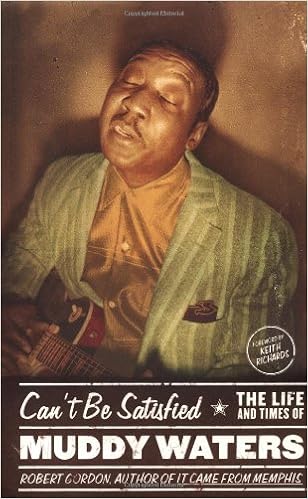
Description
From Publishers Weekly Muddy Waters's wailing slide guitar, stuttering rhythm and boisterous, sex-drenched lyrics (see "Hoochie Coochie Man" and "I Got My Mojo Working") inspired a generation of bluesmen and rock-and-rollers including a modish band of Brits who copped their name from his classic tune "Rollin' Stone." In this engaging biography, Gordon ("It Came from Memphis") mines some new territory, but the real punch comes from his telling, which reads as if he were on the front porch with friends, passing a half-pint of whiskey. Describing Waters's (nx82 McKinley Morganfield) birthplace in Issaquena, Miss., he writes that it was "where farmhands partied on weekends because they'd survived another week, because the land didn't swallow them, the river didn't drink them, the boss man didn't kill them...." In the early 1940s, Muddy fled to Chicago, cut several big hits for the budding Chess record label and became an international star. The author points out, however, that Muddy never left behind an ingrained obedience from his sharecropper days. Over the years, he would allow his bosses to tamper with his style often with embarrassing results and with his fair take of the profits. And as Gordon notes, success never did satisfy his other main passion. "He went through several wives, and always had women on the side, and women on the other side too." After all, Muddy wasn't just talkin' blues he was the blues. Copyright 2002 Cahners Business Information, Inc. From Library Journal After arriving in Chicago from Mississippi in 1943, Muddy Waters (born McKinley Morganfield) became the first successful blues man to play electric guitar while performing in the style of his heroes Robert Johnson and Son House. Gordon (It Came from Memphis) treats Muddy with the same dignity that he seemed to exude in real life. The story opens with Alan Lomax's "discovery" of Waters during one of his famous field recording expeditions for the Library of Congress. Not long after, Waters reached legendary status as the premier artist on Chicago's Chess Records. Lean times then struck in the 1950s and 1960s as rock'n'roll pushed aside the blues, but in the 1970s Eric Clapton and the Rolling Stones (named after one of Muddy's songs) turned on a whole generation of white youth to their musical idol. Gordon reveals Muddy's family life to be almost as rocky: he left several illegitimate children in his wake. Rather than judge his subject, however, Gordon lets the music do the talking. With vivid prose ("The rhythm evokes the banging of a tattered suitcase being pulled down a bumpy road"), he shows that Muddy didn't have to put on an act; he was the Hootchie Coochie Man, and he did have his mojo working. Likely to become the leading biography of this legendary artist, the book is recommended for all popular, blues, and ethnomusicology collections. Also available, though unseen by the reviewer, is Sandra B. Tooze's Muddy Waters: The Mojo Man. Lloyd Jansen, Stockton-San Joaquin Cty. P.L., CACopyright 2002 Cahners Business Information, Inc. From Booklist *Starred Review* Gordon's biography of Muddy Waters starts on Stovall's farm, where a barefoot McKinley Morganfield--Muddy's birth name--heard that "a white man was looking for him." That was Alan Lomax, who recorded guitarist Muddy's repertoire (see appendix for a list) for the Library of Congress. Muddy "didn't know what did he mean by the Library of Congress," but he got wise soon, moved to Chicago, switched to electric guitar, and created the quintessential urban blues sound. Throughout, Gordon details the gritty life reflected in Muddy's lyrics--you almost need a scorecard to keep up with the familial and extra-familial affairs of Muddy, his wives, and his outside women--rather than slings music theory, thereby creating the least tidied-up biography of a bluesman in ages, it seems. He makes Muddy the musician, Muddy the man, Muddy the parent, and Muddy the tool of the (not so) sainted Chess brothers come alive. You can feel the ugly winds of racism, hear the cacophony of the Chicago ghetto (Muddy's house stood on the dividing line between the Blackstone Rangers' and the Devil's Disciples' turfs), and share the exhilaration of Muddy's music--not to mention his way of living: told that liquor was killing him, he switched to champagne and recorded "Champagne and Reefer." Packed with facts, copiously referenced, and featuring a foreword by blues aficionado and riff-copper Keith Richards, this book is absolutely essential for any popular music collection worthy of the name. Mike Tribby Copyright © American Library Association. All rights reserved "A major feat of research and a fascinating read..." -- Jay McInerney Gordon tells the tale with deeply researched hellaciousnessx85he nails the sound of men beating on the devil with guitarsx85grade A -- Entertainment Weekly, 6/28/02 Robert Gordon has written for major music magazines in the U.S. and England, and is the author of It Came From Memphis. An indirect descendant of Jesse James, he lives in Memphis, Tennessee. Read more
Features & Highlights
- Drawn from in-depth research and detailed interviews, an authoritative biography of the father of modern blues details his turbulent life, from the cotton fields of rural Mississippi to his extraordinary rise to success, forever changing the music industry. 40,000 first printing.





